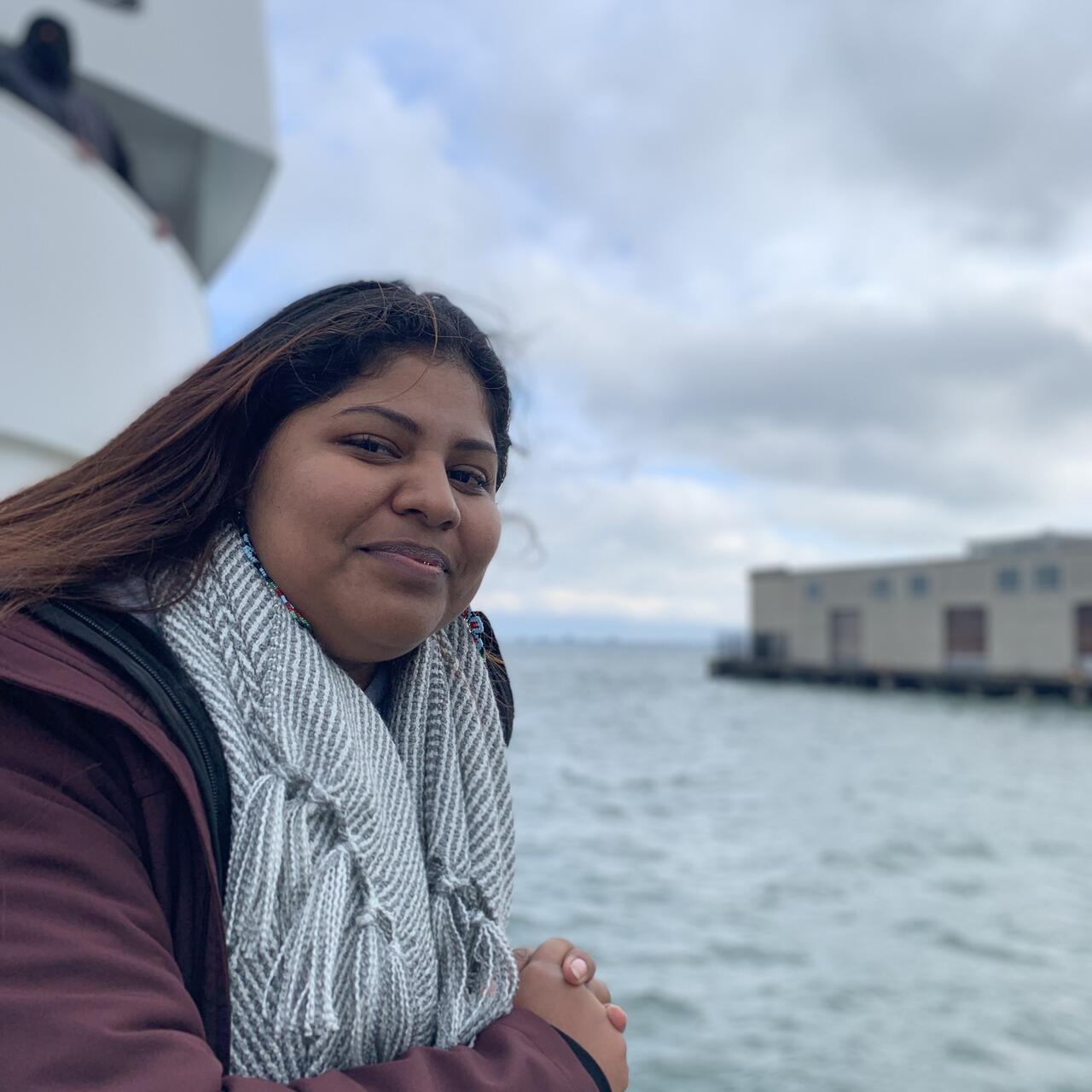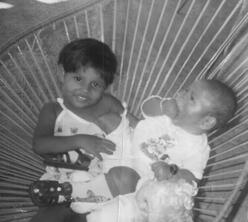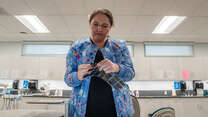
The U.S. Supreme Court’s recent decision to uphold the Deferred Action for Childhood Arrivals (DACA) program is a victory for hundreds of thousands of DACA recipients who are valued members of our families, schools, workplaces and communities.
One of those recipients is Lupe*, 22, whose family immigrated from Mexico when she was just two years old.
“When we heard about the decision, it brought a lot of relief to my family,” Lupe said. “We were anxious, stressed, and worried that if the Supreme Court didn’t decide to move forward, it would put our families’ lives even more at risk and uncertainty. It gave us hope just to know that there’s more time.”
Finding support
Lupe and her two siblings have been DACA beneficiaries since the program was introduced in 2012. They filed their renewals in May with support from the International Rescue Committee in San Diego.
“Every single day we need to be advocating for these hard-working youth and young adults who deserve to know what their futures are in the U.S.,” said Donna Duvin, executive director of the IRC in San Diego, which has been supporting refugees, asylum seekers and immigrant communities for over 40 years. “It follows America's values that we would support people who desire to do nothing more than contribute to their communities, support their families, and know safety and security just like the rest of us.”
The IRC in San Diego has filed over 300 renewal applications since January and 71 last month alone, which is indicative of the fear and concern that DACA recipients have about their futures. While the DACA program was in imminent danger, the IRC continued to provide free consultations and screenings as well as Know Your Rights presentations across the county. The office also has a former DACA recipient on its team, who has been instrumental in helping families through this process.
We were anxious ... that if the Supreme Court didn’t decide to move forward, it would put our families’ lives even more at risk and uncertainty.
“We know that DACA recipients are strong contributors overall to the community and economy with many of them being essential workers,” Duvin said. “More than 200,000 are front-line workers and are mainstays in keeping health care support going during COVID-19.”
Working through the pandemic
As DACA recipients, Lupe and her siblings can continue working full-time to support their family.

“We had to take on those financial responsibilities and also prepare for the worst,” Lupe said of the economic uncertainty ushered in by the coronavirus pandemic. “Should we purchase a house so we don’t have to pay rent all the time? There are many things we want to move forward with but we’re also limited.”
Lupe currently works for a California foundation that helps underserved communities access affordable health care. As a youth engagement fellow, Lupe supports the leadership development of young people across the state and consults on youth development programs.
“We are trying to incorporate young people's input and community perspective into the foundation’s goals and vison, by strategizing with them and challenging them to think beyond what they’re used to,” Lupe said. “We do site visits across the state and connect with on-the- ground community organizers who work directly with young people and young people of color particularly. We create relationships, collaborate and strategize to make sure that their voices are heard in the foundation.”
Securing her future
Lupe first became a youth leader at age 14 while growing up in the City Heights neighborhood of San Diego. She worked with a local advocacy network to create more youth-friendly recreational facilities and she became the youngest serving member of the City Heights Area Planning Committee, which takes residents’ input into community development.

When DACA first passed, Lupe remembers the relief she felt in knowing she could apply to college and continue her work.
“I thought I wasn’t going to be able to receive financial aid and go to college, but then DACA came into place and it created this pathway for me that I knew my older sister was not initially able to get,” she said, noting that DACA didn’t exist when her sister graduated high school. “That was a motivator for me and I had to acknowledge that. Not everyone who's undocumented has this opportunity and access, and it changed a lot for me. I wouldn't be able to work right now if I didn't have DACA.”
Lupe is no stranger to hard work. From a young age, she remembers her parents telling her, “Tienes que poner el doble de esfuerzo,” which means, “You have to put in double the effort.”
“That phrase always stuck with me as I was growing up,” Lupe said. “I knew that I had to try harder, and I knew that I had to always aim to be better, the best that I possibly can be. I understood that I was different and that I was not going to be able to reach my dreams if I did not work hard enough.”
I knew that I had to try harder, and I knew that I had to always aim to be better, the best that I possibly can be.
Lupe went on to receive her Bachelor’s degree in Sociology at the University of California, Merced and work at the Office for Services for Undocumented Students, where she developed workshops and advocacy programs.
Now she pulls from her experience to help guide a new generation of youth leaders through her work.
“I know that they're going through financial stress or misunderstandings in their family because their parents may not understand the injustices and systemic racism they’re facing, and how it builds up in their body,” Lupe said. “I had to understand that; I had to work through my emotional and mental health first before I could show up for anyone else in my community.”
More than a Dreamer
Lupe has worked hard to carve her own path and identity. She does not identify as a “Dreamer” — a term commonly applied to DACA recipients.

“It perpetuates the ‘good immigrant’ narrative — that undocumented people who are achieving higher education and who ‘speak good English’ are the ones who deserve more opportunities like a pathway to citizenship,” Lupe said. “Folks who are not DACA recipients may not necessarily meet the standards and narrative, and may not have access to resources and opportunities, such as college readiness programs or community-based organizations.
“I think about the young people I have supported in the past,” she added, “like a mentee who lives in Merced, a rural town, who had to work in the fields because his city did not provide youth employment. Even if he had DACA, his options were limited. His access to further his dreams and goals were limited.”
The recent DACA decision is also just a temporary solution for many immigrants still seeking safety and a place to call home.
"Although DACA continues today, the program is still in jeopardy,” said Hans Van de Weerd, the vice president of Resettlement, Asylum and Integration at the IRC. “A permanent solution is needed to ensure security and stability for the more than 825,000 DACA recipients and millions of undocumented immigrants who call this country home.”
As Lupe’s father said, “Nada ha cambiado. Si, estamos mas aliviados, pero todo esta igual." [Nothing has changed. Yes, we are more relieved, but everything is the same.]
This DACA ruling is not a celebration, but a reminder that this country likes to put ‘curitas’ or bandages on issues.
“He understands that there is no safety through this decision, that it does not guarantee protection or a change in our lifestyle,” Lupe said. “We get to breathe for a bit, pero nuestra lucha sigue [our fight keeps going]. This DACA ruling is not a celebration, but a reminder that this country likes to put ‘curitas’ or bandages on issues.”
To ensure that DACA recipients can make a home in the U.S., the Senate must pass the bipartisan American Dream and Promise Act (H.R. 6), which already passed the House.
Until then, Lupe’s future remains uncertain.

“I have to prepare for my future, but I have to be aware that my plans for my future may not happen,” she said. “It’s very hard for me to be hopeful and stay positive sometimes, but I know that whatever work I do, I will always try to support young people, particularly young people of color, and help them continue to discover their voice and not feel useless and powerless, as I did at some point.”
It’s this work with youth that gives her hope for what’s to come.
“When I see a young person step up to the podium and share their story, or when I can be in a meeting with decision-makers and share a table with them, that's where I get my hope from,” Lupe said.
I have to prepare for my future, but I have to be aware that my plans for my future may not happen.
“Because I know that we're preparing them and we're equipping them with the necessary tools and mindset to be able to continue the fight that a lot of us have been in. I’m hopeful for young people of color, young immigrants and undocumented individuals to find that voice and power in them and just push through.”
Editor's note, 12/16/20: We caught up with Lupe again after a federal judge ordered that DACA be reinstated in full and that new applicants be allowed to apply. Here’s what she had to stay:
"Reinstating DACA opens doors to young undocumented people. I think about my mentee in Stockton, California, who has difficulty finding a stable job and supporting her family because she didn’t have the privilege of receiving DACA.
"I think it’s a call to action for funders and community-based organizations to be ready to support DACA applicants. We are still in the middle of a pandemic and undocumented families have received little to no support for many reasons. I hope to see direct investments in legal services to alleviate the financial stress on families who are already struggling to keep their homes during a pandemic.
"This ruling allows many folks, like myself, to reimagine our future. My parents continue to pray that someone in the White House will recognize our gifts and talents and provide the support we deserve.”
Learn more
The IRC will continue to provide direct immigration legal representation on behalf of more than 2,000 individual DACA recipients, alongside legal information and ‘Know Your Rights’ workshops to ensure they continue to enjoy basic civil rights including the right to work. The IRC stands with all Dreamers and will continue to advocate for a pathway to permanent residency and citizenship. Read more about our immigration work.
*Last name omitted for privacy reasons. Photos courtesy of Lupe.



